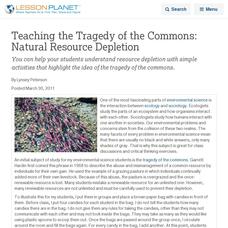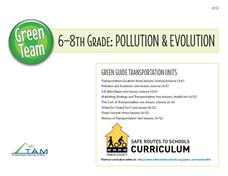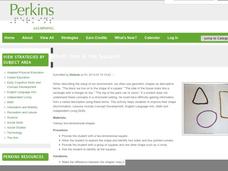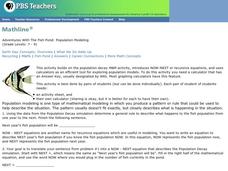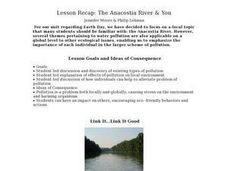Curated OER
A Tree is a Friend
Fifth graders discover the value of trees in our society. In this ecosystem instructional activity, 5th graders read the book, A Tree is Nice, and discuss with classmates how trees are essential to our existence due to creating...
Curated OER
Teaching the Tragedy of the Commons: Natural Resource Depletion
You can help your students understand resource depletion with simple activities that highlight the idea of the tragedy of the commons.
Curated OER
A Design You’ll Dig: Designing a Habitat for Worms
Students discover how worms contribute to the balance of the environment. In this composting lesson, students study the composting and decomposition processes. Students then create habitats for worms that allow them to do their jobs.
Safe Routes to School
Pollution & Evolution
Bring together a study of two major scientific topics with a lesson on the relationship between pollution and evolution. With the help of a PowerPoint presentation, hands-on activity. and class demonstration young scientists learn...
Curated OER
Water Conservation
In this environment worksheet, learners look for the facts of how to conserve water and help the environment. They complete the activities as part of the unit.
Curated OER
Arbor Day
First graders study the importance of trees to our environment. they make their own version of the story by completing the following sentence and then completing an illustration for their writing. "A tree can be ______."
Perkins School for the Blind
Which One is the Square?
Children who are blind need to constantly be engaged in building conceptual understandings of the world around them. This activity will help them grasp the concept of shape, identify shapes, and consider shapes as they are used to...
Curated OER
The Parts of an Insect
Students examine various insects. They discuss the parts of an insect and the environments in which they live. Students explore the importance of insects to our environment. They draw an interpretation of their insect and label its parts.
Core Knowledge Foundation
A “Whole” Lot of Fraction Fun!
Young mathematicians are introduced to fractions in a unit that helps them to understand parts of a whole.
Mobile Education Store
Rainbow Sentences
Learners who struggle with grammar, foundational reading skills, and sentence composition can learn how to write proper sentences using an app that relies on research-based practice. It uses a color-coded formula that had been proven to...
Curated OER
Environment" The Mining Cycle
Students explore the world of mining and explain its importance in daily life. After describing how companies search for mineral deposits, they examine the environmental consequences of mining as well as the positive aspects. The...
Krzysztof Haft-Szatynski
Move the Turtle
Turtles are not known to be speedy movers, but have you ever tried to get them to move in a specific direction? How about getting them to move in a perfect circle? With this app, young computer programmers have to be on their toes to...
PBS
Adventures With The Fish Pond: Population Modeling
Build up from the previous activity where your learners charted the population growth and decay of a fish pond with M&Ms®. Have them look at the data from that activity and create a Now-Next, or recursive equations, to predict the...
Curated OER
Animal Electronic I.D.
Students discover ways to keep the animals in our environment safe by examining electronic I.D. tags. In this animal safety lesson, students participate in a role-playing activity in which they are monitored by an electronic I.D....
Curated OER
Eco-Warrior
Students recognize that a man's actions in changing his environment can have drastic results for their world. They discuss the use of energy conservation and the use of recycling materials to improve our environment.
Curated OER
Overpopulation
Learners examine population growth and how it impacts our environment. In this population lesson students identify the causes and consequences of overpopulation.
Curated OER
Taking Care of Nature (Religious)
Students discover how they can help care for the earth. In this environmental protection lesson, students discuss how God created the earth and what will happen if they fail to care for the earth properly. Students grow their own...
Curated OER
Bank On It! Plants
In this science and language arts activity, students read an article about plants. They select from 7 words to complete the article. Students learn about the advantages of plants to our environment and practice reading comprehension.
Curated OER
Studying the ABC's of the Environment
Third graders choose a letter of the alphabet and find an environmental topic to research that begins with the same letter. They prepare an article and illustration about their topic and compile them into a class environmental alphabet...
Curated OER
BEE a Part of Our Community
Students reflect how to form a respectful classroom community. In this communities lesson, students construct a "community web" of positive comments and predict what happens to the web when negative comments are made. Students discuss...
Cornell University
What is IPM?
Discover what a pest is and how to identify one with a lesson that looks closely at our outside world and taxonomy. Scholars investigate insects and plants to practice their identification skills, take a survey, and explore the...
Curated OER
Disguise for the Eyes
Young scientists discover how many, many animals use color as a way of helping them to survive in the wild. They understand how animals use color in their everyday lives. Pupils engage in hands-on activities, watch videos, access...
Curated OER
Telecollaboration Lesson
Sixth graders explore the Caribbean sea and the Arctic ocean. They become familiar with the living conditions of others. Students investigate the geographic location of each area. They become familiar with important events that helped...
Curated OER
Lesson Recap: The Anacostia River & You - Biology Teaching Thesis
Seventh graders give examples of local sources of pollution and postulate reasons as to why local sources of pollution can harm the ecosystem. They address the following question in short answer form: "Why is litter/chemical pollution...



